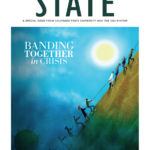Reporting contributed by Tony Phifer, Andy Dixon, and Haley Sue Robinson
On a recent summer morning, a crew of Colorado State University employees packed boxes with produce and staples at a new food pantry on campus. Into the boxes went apples, carrots, onions, beans, bread, peanut butter. Into the arms of students went the 30-pound boxes.
The distribution was part of Rams Against Hunger. The program provides food to low-income students facing shortages as they work to pay the full costs of university attendance, expenses that have grown especially worrisome during the COVID-19 pandemic. For many students, tuition and fees are just part of ongoing financial concerns – and those costs are frequently covered for students who qualify for scholarships and other forms of aid. In fact, the combination of housing, bills, food, and related living expenses can often form barriers to higher education.
“It gives me peace of mind,” a graduate student in ecology said, as she accepted a cardboard box filled with food.
The COVID-19 pandemic has sharpened cost-of-living woes for many students, as they and their family members have lost jobs during spiking unemployment. In one sign of intensified need, the number of people seeking help from Rams Against Hunger more than doubled early in the pandemic, from about 800 to nearly 2,000 per month, said Michael Buttram, who coordinates the program. Demand is so significant that the campus food pantry, earlier a monthly program, now runs in the Lory Student Center three times each week and is open to students and others in the campus community who are struggling to get by.
“The student can’t be a student until they have their basic human needs met,” Buttram said. “A person needs food, clothing, shelter, and health. Without those things, a person can’t be a student.”
The pandemic pushed university classes online and largely emptied physical campuses last spring, but that did not change basic needs or costs of living. For low-income students, including many first-generation scholars, needs are expected to increase as in-person classes resume next month and the pandemic’s economic fallout wears on.
“With the pandemic, literally thousands of students are experiencing both loss of income because of lost jobs and additional expenses due to housing issues, technology needs, food insecurity, and the list goes on,” said Tom Biedscheid, CSU assistant vice president of enrollment and access. “These financial hardships can cause students to disenroll, and that’s the last thing we want to see happen.”
In response, programs offering food and financial relief have started or expanded on all three CSU System campuses to help students stay on track. Several programs also support faculty and staff. In Fort Collins, Rams Against Hunger and Ram Aid, an emergency fund, are important resources. At CSU Pueblo, the Pack Pantry and Embrace the Pack provide aid. CSU Global, an entirely online university, is offering new enrollment options and scholarships to deliver financial relief.
“I was laid off, but the support will allow me to continue my education without pushing back my graduation,” said Elias Papadakis, a CSU Global student and former airline employee. He had four classes to finish for his bachelor’s degree in human resource management when the pandemic decimated the travel industry.
Danielle Kasmarik, another CSU Global student, is in a master’s degree program in health care administration. Her employer had supported her studies but could no longer do so with the financial challenges of COVID-19. “I am so grateful for CSU Global for making sure I could complete my spring courses without taking out substantial loans. The support made it possible for me not to delay my degree, and it will make a big difference in my career plans,” Kasmarik said.
Beyond administering campus-based support, System staff have swiftly distributed funds to thousands of qualifying students through the federal Coronavirus Aid, Relief, and Economic Security Act and have connected disadvantaged students who do not qualify to other emergency resources. The latter group includes international and undocumented students.
For instance, Vincent Ontita, from Nairobi, Kenya, is working on a master’s degree in conservation leadership at CSU and was set to return to his home country for a research project when the pandemic terminated his job and travel plans. Ontita suddenly faced unplanned housing and living expenses; he found help through Ram Aid. “I was so stressed thinking about how I was going to pay for rent and food, and the program removed the stress and helped me focus on my studies,” he said.

Donors are stepping up as similar stories emerge. Many understand that helping students meet basic needs is central to System and campus missions of providing access to higher education and related opportunities. “During the COVID-19 crisis, the need for these relief funds has grown exponentially, and our donors have responded with incredible generosity,” said Kim Tobin, vice president for University Advancement at the flagship campus in Fort Collins.
In one case, an anonymous donor contributed $1 million to the CSU Ram Aid program. The gift will provide emergency aid for hundreds of students straining to pay bills while staying on track to earn their degrees.
How important are donors who extend stopgap support? “They are helping me achieve my dreams. I’m so grateful for the people who donate to Ram Aid – they are making a big impact on my life. I hope to give back myself one day,” said Ricky Reyna, a Ph.D. candidate in systems engineering. He had been covering expenses through work for a software company; the pandemic brought that to an end.
The campuses also have been creative in helping students. In Fort Collins, the CSU College of Business started a series of online courses, called “Rethink, Reinvent, and Recover: Preparing for the Challenges of an Uncertain Future,” designed to help business people manage change in the pandemic. The courses were free, but the college asked enrollees to donate to Rams Against Hunger.
“I talked to one student who works three jobs to help pay for school and was laid off from all three. In challenging times like this, philanthropy may be the only mechanism that allows a student to pursue their dream of attending CSU or enables a student to stay in school. That’s important because education is the way to a more secure future,” business Dean Beth Walker said.
At CSU Pueblo, coordinators of the Pack Pantry have established a system for online requests and have scheduled food pickups that avoid face-to-face interaction for students, faculty, and staff facing food insecurity. In another pandemic pivot, the CSU Pueblo Foundation was forced to cancel its annual President’s Gala, a springtime fundraiser, and instead called upon would-be attendees to donate to Embrace the Pack. The one-month online campaign raised $82,000 – funds earmarked entirely for emergency tuition support; donations far surpassed expectations, and the total is notable at a small campus with about 4,000 students, said Todd Kelly, chief executive officer of the CSU Pueblo Foundation.
Dan Tyler, a CSU professor emeritus of history, understood the weight of cost-of-living expenses well before COVID-19. He established a fund to provide crisis aid for students in the College of Liberal Arts. “I want to focus on the kids who have the courage to move forward despite the challenges they’re facing,” Tyler said. “That takes guts.”
To donate, visit university websites.





